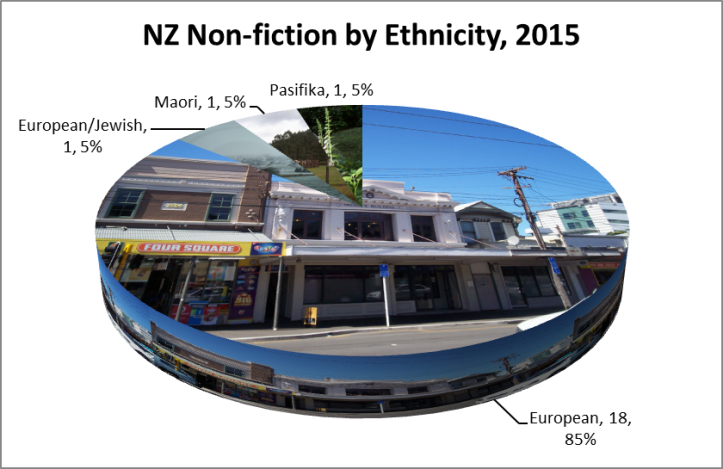…and here is the breakdown of fiction published in New Zealand in 2015, by the gender and ethnicity of the authors (as far as I can make out).
In terms of gender, women dominate in the fiction stakes, with 44 fiction books by women published in 2015 (59% of titles) compared with 30 men (40%). The ‘Other’ category refers here to a book jointly authored by a man and a woman.
Here is the pie chart:

In non-fiction, the proportions are reversed, with 13 titles (62%) by male writers and 8 (38%) by female writers (see below). So it kind of balances out. If you add fiction, non-fiction and poetry together, 82 titles were by women, 83 by men and one by both. Yay, right? (Note: I’ve left out a few categories, like Drama and Criticism, but included Letters & Autobiography).

An analysis by ethnicity, however, tells a miserable little tale indeed. Here is the pie chart for fiction:

Yep, that’s right, with 68 titles, Pakehā writers got 91% of the pie; Māori writers and Asian/Indian writers got 4% each with 3 titles apiece and Pasifika writers got 1%, with a single title (ie Albert Wendt wrote a book).
By way of comparison, in 2014, 88% of fiction titles were by Pakehā writers, 7% by Māori writers, 5% by Asian/Indian writers and none by Pasifika writers.
And for non-fiction, 85% of titles (18 in total) were written by Pakehās and 5% (1 title each) by a European/Jewish writer, a Māori writer and a Pasifika writer.

How do I know what ethnicity everyone is, I hear you cry. Well, I don’t know for sure. I visit at least 3 websites (author pages and so on) and look for clues. So there may be some undercounting. If a writer does not describe themselves as Māori, Asian or Pasifika and does not mention an iwi affiliation, I have counted them as European/Pakehā.
One last pie: all fiction, non-fiction & poetry titles for 2015. 90% of titles were by Pakehā, 4% by Māori and 2% each by European/Jewish, Pasifika and Asian authors. What a lot of pie…

For the record, I’m female and Pakehā (I was born in the UK and grew up in England, South Africa, Australia and New Zealand; I’ve lived in New Zealand since I was twelve.) Two of the books published in 2015 were mine.
I put this analysis together because it matters to me. Fairness matters. Having a national literature that represents our national population matters. Being able to read a diverse range of voices matters. Also, I’m curious (in more ways than one) and like playing with spreadsheets 🙂
My source for the books published in 2015 is the Journal of Commonwealth Literature. Previous posts on this subject can be found here:
https://janisfreegard.com/2017/01/07/nz-poetry-2015-by-gender-ethnicity/
https://janisfreegard.com/2011/07/29/poetry-gender-in-new-zealand-publishing-part-2/
https://janisfreegard.com/2012/04/03/poetry-gender-in-new-zealand-publishing-2008-2010-4/
https://janisfreegard.com/2013/03/23/poetry-gender-in-new-zealand-publishing-an-occasional-series/
https://janisfreegard.com/2014/10/19/poetry-and-gender-in-new-zealand-publishing-the-latest/
https://janisfreegard.com/2015/12/30/poetry-published-in-new-zealand-by-gender-ethnicity-to-2014/
https://janisfreegard.com/2016/02/08/nz-fiction-non-fiction-by-gender-ethnicity-2014/

Interesting reading, Janis. These things are important to know. What’s the ultimate source for the ‘European/Jewish’ subcategory? I think it’s invalid and would like to find out why someone has set it up. Thanks.
Thanks Mary. There were 2 writers who described themselves as European and Jewish, so rather than me trying to fit them into a box, I just used the category they had chosen for themselves.
I think they were silly – it’s just muddying the waters, to my mind. It’s a category I would fit into myself but wouldn’t bother stipulating, since it can encourage people to think of religion as a race. Again, thanks for your work on this – we need to know.
[…] report by Janis Freegard revealed that of 68 fiction titles published in 2015, 91% were written by Pākehā, 4% by Māori, […]
Thank you for this important work – which Im citing in my upcoming lecture! The numbers by ethnicity are dismal, but not surprising. Its slightly better when you look outside the margins. I’m Samoan/Maori and I released two novels in 2015, and one in 2014. But Im an indie publisher so my titles arent listed on the source material used for the survey. There’s a lot of exciting things being done in the ‘wilderness’ outside the traditional publishing industry, where marginalised writers are thriving and we can read a rich variety of diverse voices. My children are educating me about fanfiction sites, peer reviewed writing sites, web comics, group storytelling , choose your own adventure apps and more.
Thanks Lani! Pleased it’s useful for your lecture. And yes, you’re right, there are many great new platforms for people to get their work out there.
[…] having a “moment” because they’ve noticed a few of them are being published now. Meanwhile, statistics about books published in Aotearoa show that more than 90% are by Pākehā writers. Those are 2015 […]
[…] New Zealand Fiction & Non-Fiction by Gender & Ethnicity 2015 NZ Poetry 2015 by gender & ethnicity Poetry & Gender in New Zealand Publishing Part 2 Poetry & Gender in New Zealand Publishing 2008 – 2010 Poetry & Gender in New Zealand Publishing – an occasional series Poetry and Gender in New Zealand Publishing – the latest Poetry published in New Zealand, by gender & ethnicity – to 2014 NZ Fiction & Non-fiction by gender & ethnicity 2014 […]
[…] Gets Published in Aotearoa? – the 2019 round-up New Zealand Fiction & Non-Fiction by Gender & Ethnicity 2015 NZ Poetry 2015 by gender & ethnicity NZ Fiction & Non-fiction by gender & ethnicity […]